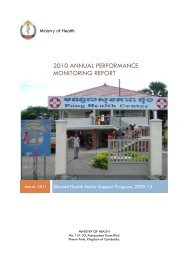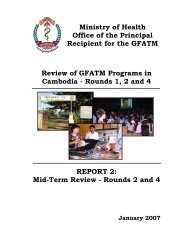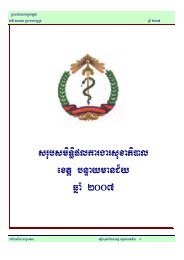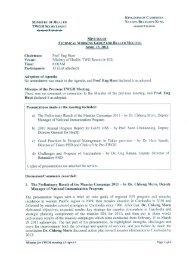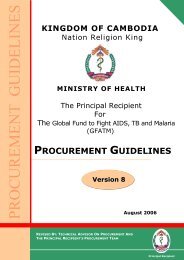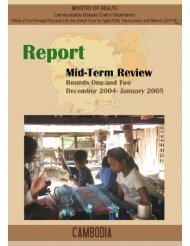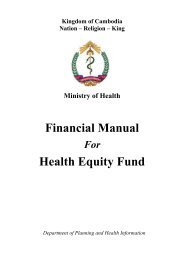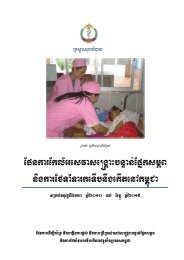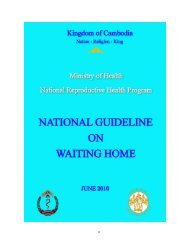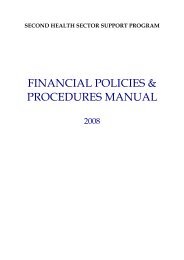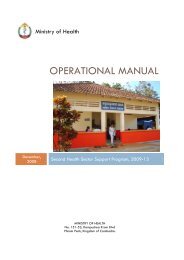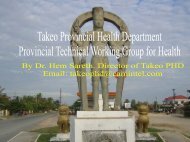Joint Annual Performance Review 2007 - Ministry of Health
Joint Annual Performance Review 2007 - Ministry of Health
Joint Annual Performance Review 2007 - Ministry of Health
You also want an ePaper? Increase the reach of your titles
YUMPU automatically turns print PDFs into web optimized ePapers that Google loves.
Quality Assurance Office include the creation <strong>of</strong> quality assessment tools and a total <strong>of</strong> 12<br />
provincial and municipal hospitals have been assessed. In addition, the Quality Assurance<br />
Office has been involved in the creation and testing <strong>of</strong> a national licensing and accreditation<br />
system to facilitate health services, both in the public and private sector, in accordance with<br />
the priorities agreed upon and in collation with development partners.<br />
4. Human Resource Development<br />
One <strong>of</strong> the highest priorities in human resource development in the health sector is staff<br />
training and distribution in support <strong>of</strong> the development and functioning <strong>of</strong> referral hospitals<br />
and health centers in providing basic health services.<br />
With regard to post basic midwifery training (3+1), a total <strong>of</strong> 85 midwives have graduated and<br />
88 students have been newly recruited for academic year 2006-<strong>2007</strong> at the Technical School<br />
<strong>of</strong> Medical Care (TSMC) and 3 regional training centers (RTCs). The increase in the number<br />
<strong>of</strong> new students will mean additional civil service posts to be provided by the Royal<br />
Government to the MoH. A total <strong>of</strong> 398 students have graduated from four RTCs as first<br />
batch primary nurses-midwives, including 192 primary midwives. A total <strong>of</strong> 246 students<br />
have enrolled in the second Batch for the academic year 2006-<strong>2007</strong>, including 146 primary<br />
midwifery students. Recruitment has been dependent upon the number <strong>of</strong> posts available and<br />
upon female candidates who live near health centers in need <strong>of</strong> midwives. The MoH plans to<br />
recruit an additional 120 midwifery students every year for school year <strong>2007</strong>-2008 at the four<br />
RTCs.<br />
In addition, a total <strong>of</strong> 84 health centre staff have received a 4-month midwifery course. In<br />
2006, a total <strong>of</strong> 170 health centers have staff with training in midwifery skills (4-month course<br />
and life saving skill course), 29 health centers have staff who have just completed their<br />
midwifery course, 14 referral hospitals have staff who have received training in basic surgery,<br />
and 14 other referral hospitals have staff with nursing training in reanimation and anesthesia.<br />
5. <strong>Health</strong> Financing<br />
The MoH is a priority ministry that receives funding support from government and the<br />
international community and, in addition the national budget is increased every year. The<br />
national budget that was provided to the health sector in 2006 is 1.08% <strong>of</strong> the GDP (target<br />
1.26%) or 6.64% <strong>of</strong> the total national budget, against the target <strong>of</strong> 10%. Total budget spent in<br />
2006 is 261,741 Million riel or 94.8% <strong>of</strong> the 2006 adjusted budget plan. Per capita<br />
expenditure from the national budget in 2006 is US$4.64.<br />
In 2006, the MoH has received the national budget in the amount <strong>of</strong> 471,298,749 riel for equity<br />
funds to support poor people in improving access to health services at 4 national hospitals and 2 referral<br />
hospitals.<br />
Equity fund projects have been implemented in 30 ODs including 7 contracting districts. The numbers<br />
<strong>of</strong> poor patients covered by equity funds have increased from 46,700 in 2005 to 89,320 in 2006.<br />
On health insurance, the numbers <strong>of</strong> community-based health insurance (CBHI) schemes have increased<br />
from 4 to 8 and a total <strong>of</strong> 33,122 household members from 7,012 households have been issued a CBHI<br />
card.<br />
6. Institutional Development<br />
A Merit Based Pay Initiative (MBPI) has been proposed based on the functional analysis report and has<br />
been discussed by the High Level Working Group <strong>of</strong> the MoH with the involvement <strong>of</strong> representatives<br />
<strong>of</strong> the Council for Administrative Reform, the <strong>Ministry</strong> <strong>of</strong> Economy and Finance, and health partners,<br />
- 88 -



